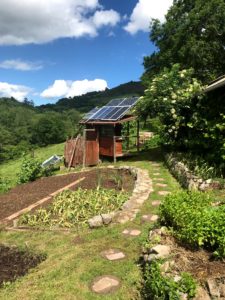As we considered how to spend our time this year, we decided to include some work-stay experiences. Having now done three in the last four months, we’d like to share some reflections on this particular mode of travel.
A work-stay is an exchange between a volunteer who works 4-6 hours per day and a host who provides food, a place to sleep, and an opportunity to learn. We found our hosts through www.WorkAway.info, a website where hosts and volunteers from all over the world post profiles, arrange work-stays, and provide feedback. The website is excellent and lets you search by location (i.e., “Asturias, Spain”) and/or keywords (i.e., “organic gardening”). There are more than 20,000 host listings that run the gamut–families seeking help with childcare and household duties; hostels and retreat centers seeking receptionists; and a slew of very creative off-grid organic agriculture, permaculture, and natural building projects.
We’re attracted to this latter group–the folks off the beaten path. It’s fun to read about their projects. You get a glimpse of people worldwide stepping away from the typical modern urban/suburban lifestyle in search of a greater connection with nature and some degree of self-sufficiency. Most have had to learn their new life skills from scratch, like growing food, building houses, raising animals, generating power, and more. And while this path is hard, the passion and enthusiasm is palpable.
As we think about how we want to live when we settle down again–and contemplate current and future environmental challenges–we find these brave souls fascinating and inspiring.
The particulars of each of our work-stays were very different, but all three hosts have something in common: they’re living their dreams! What a privilege it was to immerse ourselves with them for a short time as they welcomed us into their homes, patiently taught us new skills, and answered lots of questions.
Of our three hosts so far, Vicky, at “La Rosendo” in San Rafael de Mendoza, has been at it the longest. She left Buenos Aires 15 years ago to try her hand at growing grapes and producing “natural wine”–no agrochemicals or caustic cleaning agents, no additives, and everything is produced and bottled entirely on the farm, mostly by hand. I won’t repeat the details from our March 21st blog post (Making Wine at Finca La Rosendo) except to say that Vicky is a passionate social activist dedicated to living in accordance with her values, which include agroecology and environmental stewardship, utilizing resources wisely, and the indigenous concept of “buen vivir” (which roughly translates as good living but means so much more, including a spiritual respect for life and the earth). While at La Rosendo, we worked more hours than usual because it was harvest time, but we enjoyed tasty and healthful meals, homemade wine, and long philosophical discussions. Our last evening stretched almost to daybreak, as it coincided with La Rosendo’s annual harvest celebration with lots of Vicky’s friends, many of whom were also escapees from city life. In our month on the farm, we were also struck by the level of barter that is underway. When you have good wine to offer, it’s amazing the work people will do for you!

Fast forward almost three months to the end of May and our second work-stay, with Myriam and Suso at their 1879 manse “La Cubana” just outside the village of Venta de las Ranas (“Frogs’ Inn”) near Villaviciosa in Asturias, northern Spain. To call La Cubana a “fixer upper” would be an understatement. It’s been uninhabited for over 30 years, neglected for far longer, and the restoration will take at least five years. But the “bones” are solid: its stone walls are over two feet thick, the roof of handmade clay tiles leaks in only a few places, and most of the joists and rafters are sound. At some point in the past the 4,000 square foot house was divided into two living spaces, each with its own staircase climbing 15 feet to the second floor. Myri and Suso plan to convert it back to a single dwelling with a separate apartment for volunteers and guests (they are active in the www.warmshowers.org lodging network for touring cyclists) and a large workshop and storage space for Suso’s bicycle accessories business.
Unfortunately, Myri and Suso are waiting for permits to begin renovating the house, so we only helped with odd jobs around the property–like hacking back brambles so tall they are strangling fruit and nut trees. (Almost like reclaiming Inca sites from the jungle!) But their enthusiasm is infectious, so we were swept up in the plans for the house and can imagine it in its future glory. Suso struggles a bit with “feature creep,” which makes every detail amazing but also potentially never-ending. We’ll be following their progress on YouTube (sample here) and hope to return someday to be of more help.
Our third work-stay was also in Asturias, near the town of Nava. Liz and Steve left England with their daughter Grace seven years ago and bought a few acres of land in a hollow below the nearly abandoned village of Pandenes. (Now a teenager, Grace describes it as living “down in a hole.” Ah well…..) For the first year, they lived in a small camper while building an off-the-grid permaculture farm. What a long way they’ve come! A comfortable “straw bale” house has replaced the camper, and a deep spring provides abundant tasty drinking water. They cook on a wood stove that also heats water for showers and radiant heat. Solar panels meet most of their electricity needs, supplemented occasionally by a small generator. A large garden and greenhouse provide much of their food, and they also have some farm animals (several sheep at the moment, and maybe a few pigs soon). Liz and Steve have the cleanest and best composting toilets we’ve seen–the one we used has a sink and a big open window looking down a hill to the woods!
Liz and Steve say they’ve learned everything on the fly, as they go along. It’s hard to believe, as all of their work looks so tidy and professional, and they know so much. They’ve done a marvelous job fixing up an old stone house that they rent out as a vacation cottage, and they offer a stylish yurt and a cozy remodeled camper as well. (We stayed in the camper.) It’s idyllic! Unfortunately, Spanish tourism regulations now keep them from renting the yurt or camper on AirBnB, but they are working to change that and can still rent out the stone cottage. Check it out at www.EcofarmAsturias.org.
We were initially worried that Workaway was just for young people. While it does seem like most Workawayers are in their 20s and 30s, age really doesn’t matter. We were physically able to do the tasks that we were assigned, and we enjoyed working outdoors and seeing some of the results pretty quickly (unlike our work for most of our careers!). We were able to contribute some modest insights from our 1980s Peace Corps work (like protecting a small spring at La Cubana) and our home garden. Age may be more of a factor in terms of one’s ability to adapt to rustic living and working conditions, varied mealtimes, and more. The Workaway website helps you sort things out a bit; we decided not to pursue several interesting projects that offered living conditions or expectations that seemed unpleasant. But no matter what, you really have to be up for anything…and being open to the unpredictable can be richly rewarding in unexpected ways.
Clearly, this travel strategy is not for everyone, but we loved all three of our work-stays and hope to do a few more in the coming months. We’ve met wonderful, adventurous people–both hosts and other volunteers–with whom we hope to keep in touch. In addition to picking up some new skills, we found that we learn far more about local cultures and issues while living with our hosts than we do on our own. When you’re traveling, it’s a real treat to have friends in the community who really want you to have a great visit and can advise you on where to go and what to do. We have really appreciated all the warmth, openness and generosity.
We’ve also learned a lot about how to live with less stuff and with more environmental awareness–lessons we will apply when we settle down again. It’s been inspiring and eye-opening to spend time with good people who have gone their own way and have passionately embraced their dreams, regardless of the risks.
And so: we too are dreaming.










You are so inspiring. I’m filing your experiences as references for my retirement future!
Most interesting and so neat!
Great posting. Thanks for the part about age not mattering! I like the last line: You too (you two too) are dreaming. Bravi!
Hi Guys, Your very interesting post made me think about some similarities….I also work for free around here! Never ending chores and projects. I do get “free” lodging. But I still pay the mortgage (done with that in Nov!), utilities, taxes, insurance, food, etc. I barter my hay (approx. 75-80 bales per cutting) for brush hog services. So it feels like I am working away AND running the show! — Working Away in Woodstock!